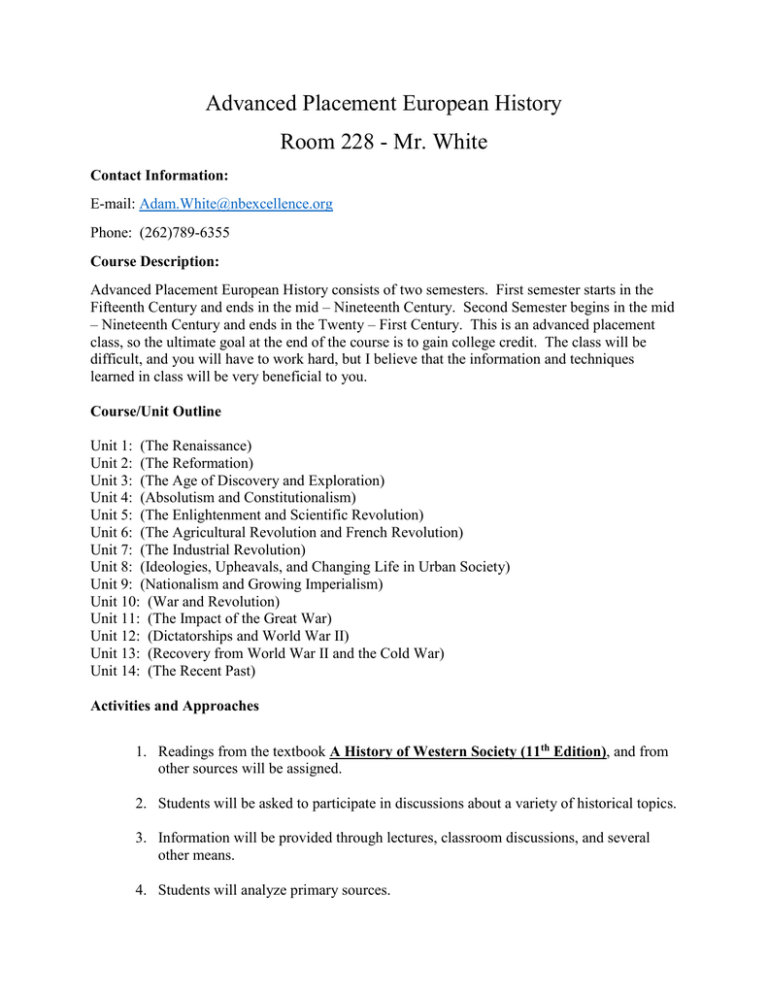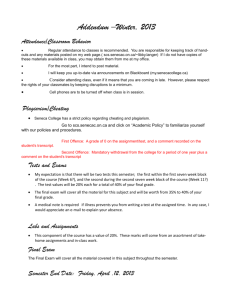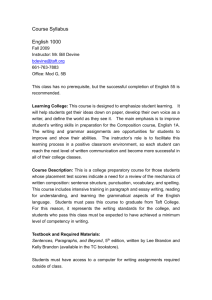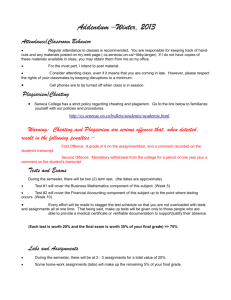Advanced Placement European History
advertisement

Advanced Placement European History Room 228 - Mr. White Contact Information: E-mail: Adam.White@nbexcellence.org Phone: (262)789-6355 Course Description: Advanced Placement European History consists of two semesters. First semester starts in the Fifteenth Century and ends in the mid – Nineteenth Century. Second Semester begins in the mid – Nineteenth Century and ends in the Twenty – First Century. This is an advanced placement class, so the ultimate goal at the end of the course is to gain college credit. The class will be difficult, and you will have to work hard, but I believe that the information and techniques learned in class will be very beneficial to you. Course/Unit Outline Unit 1: (The Renaissance) Unit 2: (The Reformation) Unit 3: (The Age of Discovery and Exploration) Unit 4: (Absolutism and Constitutionalism) Unit 5: (The Enlightenment and Scientific Revolution) Unit 6: (The Agricultural Revolution and French Revolution) Unit 7: (The Industrial Revolution) Unit 8: (Ideologies, Upheavals, and Changing Life in Urban Society) Unit 9: (Nationalism and Growing Imperialism) Unit 10: (War and Revolution) Unit 11: (The Impact of the Great War) Unit 12: (Dictatorships and World War II) Unit 13: (Recovery from World War II and the Cold War) Unit 14: (The Recent Past) Activities and Approaches 1. Readings from the textbook A History of Western Society (11th Edition), and from other sources will be assigned. 2. Students will be asked to participate in discussions about a variety of historical topics. 3. Information will be provided through lectures, classroom discussions, and several other means. 4. Students will analyze primary sources. 5. Students will learn the SOAPS approach to analyzing primary sources. 6. Students will learn techniques that will help them achieve a passing grade on the AP European History test in May. 7. Students will participate in timed essays. 8. Students will write several historical essays on a variety of topics. 9. Tests will include multiple choice and short answer questions similar to those found on the AP European History test. 10. Students will be creating presentations on a variety of topics in class. Textbook/Resource Materials The students will use the book A History of Western Society in class. You do not need to bring this book to class on a daily basis. I will let you know in advance when you will need the book for class. Required Materials and Supplies All AP students are required to take the Advanced Placement European History test on the first Friday of May. The test costs approximately $90. Classroom Rules 1. Students will be expected to be courteous and treat one another with respect. 2. Tardiness will not be accepted. Students who are frequently late to class will be issued a detention. Grading Policy 1. Grades will be based on the percentage of the total number of points you have earned during the quarter or semester. 2. All late work is due before the end of the grading period (NO EXCEPTIONS). After the grading period is completed, all late work from that unit will become a zero. 3. School policy states that students will be given a zero score on any quiz, test, or assignment that is missed on the day of an unexcused absence. Re-takes: Retakes will be available to all students in AP European History. In order to be eligible to retake an assessment a student will have to complete the following tasks. 1. Students will have to write a paragraph explaining what they did wrong on the original assessment, and how specifically they will improve their score on the retake. a. The teacher and students will then discuss this action plan during flex time before the retake. 2. The teacher and student will create a calendar of completion for the retake. a. The calendar will include specific tasks that will hopefully help the student improve their score on the retake. i. Students must complete corrections and accompanying explanations for all incorrect answers. b. Retakes must be completed within 10 school days. i. This number can be modified. 3. Students need to submit the original version of the test with the retake so the teacher can track the development of the student. 4. The teacher has the right to give an alternative assessment for the retake. a. If the retake is an essay, a different essay question (covering the same material and assessing the same standards) will be given to the student. b. If the retake is a multiple choice assessment, alternative questions will be used. 5. Parents are required to sign the original attempt. 6. No retakes will be allowed the last week of the grading period. 7. The original grade will be replaced by the new grade. a. Grades will not be averaged. Grading Scale A+ 97-100% B+ 87-89% C+ 77-79% D+ 67-69% A 93-97% B 83-87% C 73-77% D 63-67% A- 90-92% B- 80-82% C- 70-72% D- 60-62% Grade Breakdown for Papers On the AP European History exam that all students will take in May, there are two timed essays. The Document Based Question is worth a total of 7 points, and the Free Response Question is worth a total of 6 points. I will be using the following breakdown for the essays I give in class. All papers will be worth a total of 50 points. Document Based Question Free Response Questions 7 (50/50) 6 (47/50) 5 (44/50) 4 (41/50) 3 (38/50) 2 (35/50) 1 (30/50) 6 (50/50) 5 (47/50) 4 (43/50) 3 (39/50) 2 (35/50) 1 (30/50) Grade Breakdown Semester Grades Quarter 1 will be considered an “in progress” grade. All scores will be carried over to start Quarter 2. Your Quarter 2 grade will be worth 100% of your Semester 1 grade. Quarter 3 will also be considered an “in progress” grade. All scores will be carried over to start Quarter 4. Your Quarter 4 grade will be worth 100% of your Semester 2 grade. How to Contact Me 1. Feel free to contact me if you have a question or concern. 2. I will be at school most days before 7:00 am, and I will usually stay until around 3:30 pm. Classroom Community 1. We will start the year with an alphabetical seating chart so I can learn your names. Eventually we will change this seating chart. 2. Please take notes during class and keep an individual notebook for class. 3. Bring the following to class every day: Your notebook Writing utensils 4. Do not work on AP Homework, or on work for other subjects, during class. 5. Eisenhower High School has a policy that forbids plagiarism and provides serious consequences for copying on quizzes and tests. Academic Honesty Policy New Berlin students’ primary responsibilities are to learn and achieve to the best of their abilities. In order to meet the needs of each student and assess progress, teachers expect that assignments and tests represent a true picture of that student’s own performance. Administrators, faculty, students, and families are all important contributors to upholding academic integrity in our school community. This policy will provide a consistent framework to guide the learning process for staff and students. PLAGIARISM “Plagiarism” comes from the Greek root word “kidnapping” and is the theft of someone else’s ideas, words, or other without clearly acknowledging the creator and using that material as one’s own. Plagiarism includes an exact copying or rewording of another’s work, paraphrasing, partial quotation or summarization of another’s work without properly acknowledging the creator of the original work. Plagiarism includes copying any of the following without limitation: tests, homework, research, speeches, presentations, programs, class assignments, lab reports, graphs, charts, essays, compositions and term papers. Plagiarism is a form of intellectual and academic dishonesty that can be done intentionally or unintentionally. Intentional plagiarism is the deliberate presentation of another’s work or ideas as one’s own. Unintentional plagiarism is the inadvertent presentation of another’s work or ideas without proper acknowledgement because of poor or inadequate practices. Unintentional plagiarism is a failure of scholarship; intentional plagiarism is an act of deceit. Examples include but are not limited to: Downloading information from the Internet or other source and submitting it as one’s own work, and/or Submitting as one’s own work that which is copied or translated from another source. CHEATING Cheating is the deliberate or attempted use of unauthorized materials, information, technology, study-aids as well as giving or receiving improper assistance. The student is responsible for consulting the teacher regarding whether group work is permissible on assignments, projects, tests, or other academic exercises. Representing or attempting to represent oneself as another, or attempting to have oneself represented by another academic endeavor, constitutes cheating. Forging of signatures and/or falsifying or altering grade related documents, programs or information, is considered cheating. This policy will be implemented for students of all grade levels seven through twelve. Consequences will be cumulative for all high school courses. Consequences of Academic Dishonesty 1st Incident: 1. The teacher will notify the student prior to contacting the parent. 2. The teacher will notify the counselor and grade level administrator 3. The counselor will arrange a meeting with the student and student’s parent/guardian and notify administration. 4. The administration will record the incident in the school data system. 5. The offense will be reported to the Athletic/Activities Director as a violation of the SDNB Co-Curricular Code of Conduct. 6. The administration and organization advisors will review the student’s eligibility for honor societies and academic awards as well as their eligibility for student privileges. 7. The student will complete the assignment/assessment/work OR an alternate assessment/assignment as assigned by the classroom teacher at a time arranged by the staff member. 8. The student will be administered an administrative detention. 2nd Incident: 1. Steps 1 through 7 from the first incident will be followed. 2. The student will be issued a suspension from school, and attend a conference conducted by an administrator with the teacher, counselor, and student’s parent/guardian. 3. The student will not be eligible for school-based scholarships. 4. If the student accrues two plagiarism offenses and is currently enrolled in an AP course or courses, that student will not be allowed to take the AP exam(s) for any AP courses of the current semester. The student will likewise incur a reduction in credit from the 5.0 scale to the 4.0 scale. 5. Administration will notify the student and parent/guardian in writing that any future infraction in any class will result in loss of graduation/end of year privileges as outlined in the 3rd incident. 3rd incidence: 1. Steps 1 through 4 from the second incident will be followed. 2. The school will report violation of Academic Honesty Policy to scholarship committees. 3. High school students will not participate in graduation activities and ceremony. 4. Administration will notify the student and parent/guardian in writing that any future infraction in any class will result in a referral for a pre-expulsion conference as outlined in the 4th incident. 4th and any subsequent incidences: 1. Steps 1 through 4 of third incident will be followed. 2. Student will be referred for a pre-expulsion conference.







